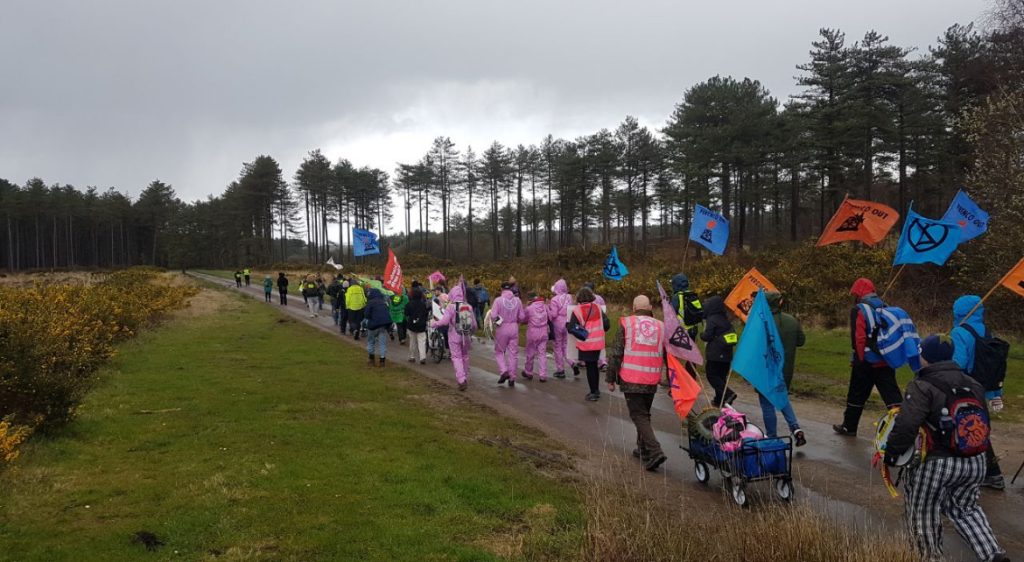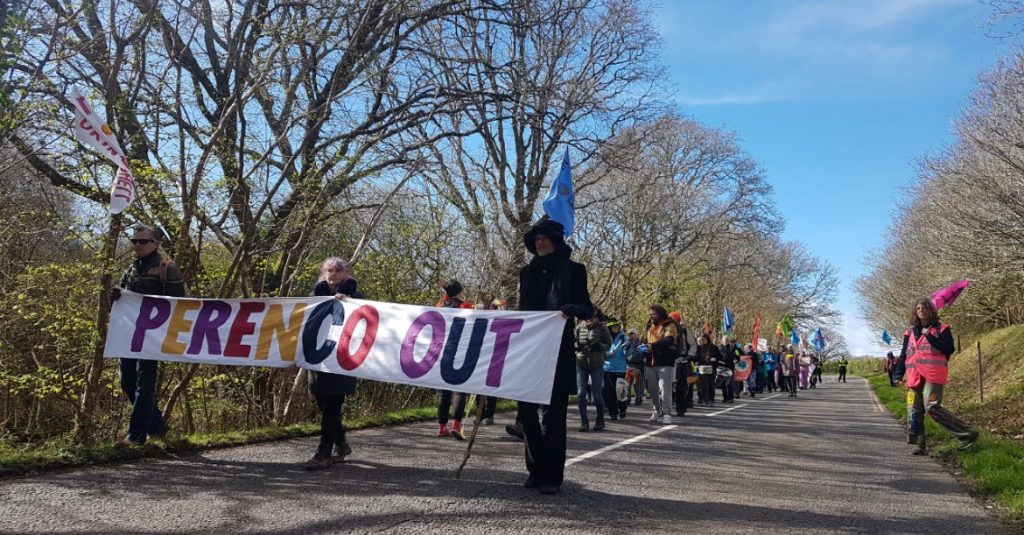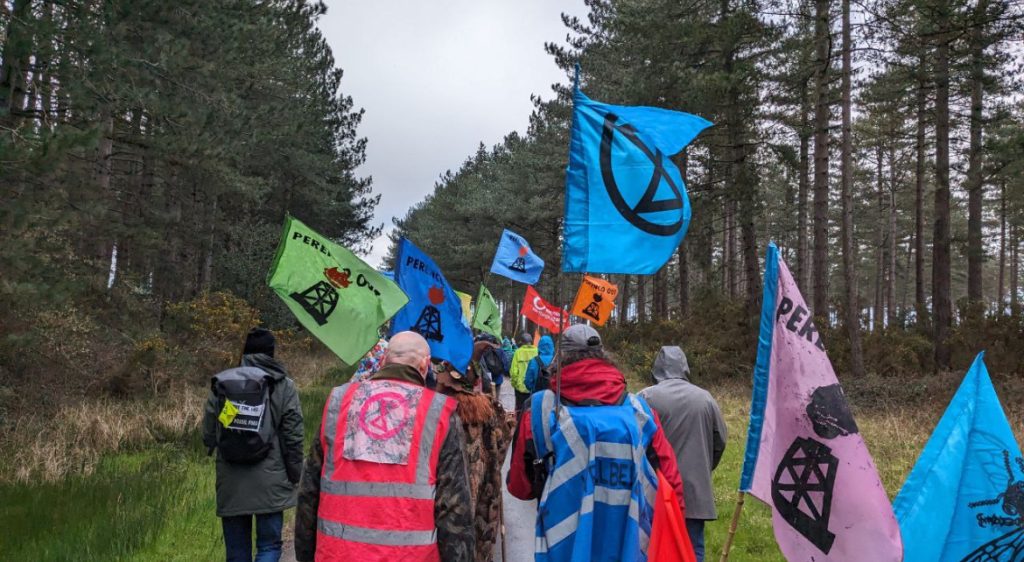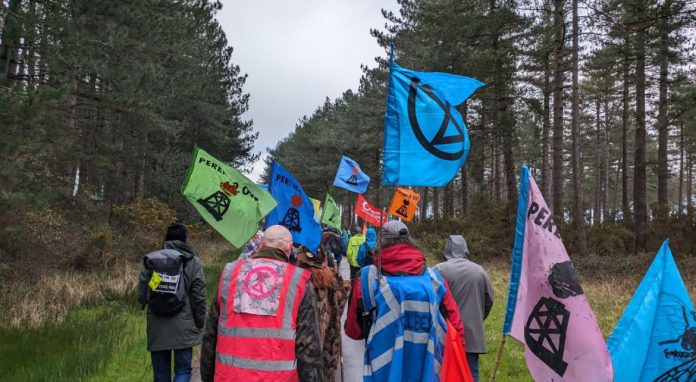In a reply to the BBC report that “Perenco UK pledges no repeat” of the oil spillage in Poole Harbour, local activists from Extinction Rebellion say the only way for Perenco to honour this pledge is to stop oil extraction in Poole Harbour now.
Extinction Rebellion groups from Bournemouth-Christchurch-Poole (XR BCP), Wimborne, Purbeck, East Dorset Friends of the Earth, Bournemouth and Poole Greenpeace, Cycling Rebellion, and other environmental groups from across the South West marched from Corfe Castle to the local offices and operating facility of Perenco’s Wytch Farm Oil Field Works on Saturday 23rd March. This was to mark the one-year anniversary – March 26th 2023 – of the Perenco Oil Spil.
In an escalation to their previous protests, Daniel Glennon from XR BCP, a 52-year-old customer service trainer from Bournemouth, explained, “We blocked the entrance to Perenco’s oil field works and offices for an hour; this was pre-liaised with Dorset Police and advised to Perenco.

While blocking the entrance to this facility, they had speeches and music, and protesters were encouraged to bring food to share and have a picnic. Peter Ohm, a 77-year-old retired ship captain and ex-Poole Harbour Marine Pilot from XR Wimborne, emphasised that the whole event “was a peaceful, family-friendly protest and rally.”
Additionally, Hannah Lindner, an Emergency Care Assistant from XR BCP, said that “in addition to the march, there were also two digital actions. People were able to join the march virtually on Saturday by making their own Perenco placard and sharing it on their social media with agreed hashtags. On Tuesday XR will target Perenco’s LinkedIn with some alternative comments of our own.”
XR’s objectives for this action were to:
· Maintain the pressure they have placed on Perenco since the Poole Harbour oil spill to stop oil extraction now! There have been five previous actions.
· To shine a light on Perenco’s operations in Poole Harbour, while also highlighting the harm they do to the environment and indigenous communities in the global south.
Dorset Council, in their press release of 19th March 2024, state that “On 26 March 2023, Perenco UK reported an estimated loss of 200 barrels (approximately 31,600 litres) of reservoir fluid from their Wytch Farm site on Poole Harbour, consisting of 15% crude oil and 85% production fluid.”
Despite this being described by some as a relatively small spillage, Dorset Council states that “Remediation works continued, subject to tidal conditions, until early January 2024. Greg Lambe, a Property Manager from XR BCP, asks “what damage would a larger spill cause and how long would it take to remove—if this were even possible—if this relatively small spill took 10 to 11 months?”.
The BBC’s report of ‘a slick about 1,300 feet long and 3 feet deep landed on the shoreline at the RSPB’s Arne reserve, about a mile along the coast from Wytch Farm’ prompted Peter Robertson, senior RSPB site manager, to say, “this is one of Europe’s most important wildlife spots, to have oil extraction in the middle of it, you have to have absolute safeguards in place. We know that the infrastructure is old. We would take some reassuring to know that there isn’t going to be a repeat.”
Also reported by the BBC Martin Price, from East Dorset Friends of the Earth, said: “Our message to Perenco is that you should be shutting this field down as soon as possible. The potential risks are huge.”
Greg added that we should not forget how important Poole Harbour is in terms of wildlife designations; “it is the largest natural harbour in Europe, it is a designated Area of Outstanding Natural Beauty (AONB), it is an area of international importance for wildlife conservation, it is a Site of Special Scientific Interest (SSSI), is on the Ramsar list, and is a Special Protection Area (SPA) for birds. It borders three national nature reserves, including the internationally important Studland and Godlingston Heath NNR, and a number of local and non-statutory nature reserves run by organisations such as the National Trust and RSPB, including Arne”. Greg says “the risk of another, possibly much larger oil spill is far too high, especially as this oil field is in its ‘end of life’ stage, where investment in old infrastructure will likely be lacking, and that, as such, extraction should stop now.”
This was the sixth protest XR BCP have organised regarding this pollution incident. Their first protest and information sharing event was on the 27th March at Poole Quay. This was followed by a mass demonstration on 1st May at the local offices and operating facility of Perenco’s Wytch Farm Oil Field Works. On Sunday 11thJune they held another information raising event at Poole Quay. At the beginning of September, they coordinated with XR Oxford and London to take the battle to Perenco’s headquarters in London. To mark the passing of a calendar year they held a rally at Poole Quay on 6th January informing residents what had, and, from their perspective, what had not been done, to prevent another spill.

In terms of shining a light on Perenco’s operations in the global south, XR BCP points to a report in AP News. The Democratic Republic of Congo (DRC) is one of 14 countries in which Perenco drills for oil. They began drilling in Moanda territory in the DRC in 2000. Residents say ‘pollution has worsened, with spills and leaks degrading the soil and flaring — the intentional burning of natural gas near drilling sites — fouling the air they breathe’. Perenco said it ‘abides by international standards in its extraction methods, that they don’t pose any health risks and that any pollution has been minor.’
Ralph Doe, a retired businessman from XR BCP, said that to describe any pollution as minor is not acceptable. He states that the DRC is home to “most of the Congo Basin rainforest, which is the world’s second largest rainforest, and is home to most of the world’s biggest tropical peatland, which is made up of partially decomposed wetlands plant material”.
AP journalists visited drilling sites, some just a few hundred metres from homes, that had exposed and corroding pipes. They also saw at least four locations that were flaring natural gas, a technique that manages pressure by burning off the gas that is often used when it is impractical or unprofitable to collect.

AP quotes Adore Ngaka, a local resident, who says that his ‘home reminds him daily of everything he’s lost’. He says that the oil ‘extraction in his village in western Congo has polluted the soil, withered his crops, and forced the family to burn through savings to survive.
Ralph virulently argues that drilling for oil, and the risk it poses, in this environment should not be allowed.
Ralph had a final message to share, “We are determined to keep the risk of another oil spill in Poole Harbour and Perenco’s operations abroad, at the top of the local and international environmental agendas, and we will be taking further action in the coming months.”
If you like our content, join us in helping to bring reality and decency back by SUBSCRIBING to our Youtube channel: https://www.youtube.com/channel/UCQ1Ll1ylCg8U19AhNl-NoTg AND SUPPORTING US where you can: Award Winning Independent Citizen Media Needs Your Help. PLEASE SUPPORT US FOR JUST £2 A MONTH https://dorseteye.com/donate/







